by Steve Selden | Jun 4, 2018 | Churchill News

The Port of Churchill still vacant while the sale of the business is in limbo. Katie de Meulles photo.
There are no groundhogs in Churchill! So, there really cannot be a “groundhog” day. However, with the recent announcement of the Port of Churchill and the Hudson Bay Line being sold again there seems to be some confusion.
There apparently is another informal agreement that will reestablish ownership of the Hudson Bay Rail line and the Port of Churchill within the northern Manitoba community and keep the facilities under Canadian control.
One North and Missinippi Rail LP have joined forces with Fairfax Financial Holdings and come to an informal agreement to acquire the dormant assets from current owner Denver, Colorado-based Omnitrax.
Fairfax, a Toronto-based investment company, agreed to partner with One North and Missinippi Rail this past November, to purchase Omnitrax’s northern Manitoba assets.
The arrangement includes the participation of 41 First Nations and non-First Nation communities in northern Manitoba as well as seven Kivalliq communities in western Nunavut, along with Fairfax and AGT, the government said.
Omnitrax owner Pat Broe and Fairfax president Paul Rivett negotiated the acquisition, but there are multiple legal issues to finalize before prior to a finalized deal can be completed.
Churchill mayor and One North co-chair Mike Spence has been waiting a long time for this deal to materialize. Spence has been tirelessly lobbying for a deal since Omnitrax began reducing the frequency of rail service to Churchill nearly two years ago.
However, as we all have seen, this deal will not be official until papers have been signed and money exchanges hands. We have seen far too many deals or rumors of deals taken away with the tide of the Hudson Bay.
“Priority No. 1 will be rail line repairs in the very near future and to finalize the acquisition,” Spence wrote in a statement.
“This is a historic partnership involving Indigenous and northern communities with industry leaders that now positions the Port of Churchill as an Arctic gateway for future prosperity.”
The Hudson Bay rail line to Churchill was washed out by a flood runoff from two late spring blizzards in May 2017. Since then, Omnitrax has refused to repair the tracks and has been in an ongoing battle with the Canadian Government over responsibilities regarding the repairs. Initially, the costs of repairs were between $40 and $60 million. Omnitrax claimed it was unable to cover those high costs.
Canada Prime Minister Justin Trudeau stated last year that Omnitrax is responsible for getting the train line up and running again. While this is being settled, at this point most likely through new ownership, the federal government has been providing ongoing subsidies to northern residents to help defray escalating costs of goods shipped north.
by Steve Selden | May 23, 2018 | Churchill News

Train engine being hoisted onto the cargo ship at the Churchill Port. Katie de Meulles photo.
The Port of Churchill is minus one prospective suitor for possible acquisition. The group, iChurchill and a First Nations consortium led by Glenn Hudson, Peguis First Nations Chief has withdrawn from bidding on the Port and the Hudson Bay Line.
“We are disappointed to have put so much time, effort and money into what would have been a timely solution for the people of Churchill and the economy of Western Canada, but we have apparently run up against politics,” said Louis Dufresne , CEO of iChurchill,
“We finally met last week with the government of Canada’s negotiator on the file, Mr. Wayne Wouters, and he made it clear that the government is willing to deal only with one specific company, a Toronto-based financial firm. We can’t understand why this is, given that our partnership meets all of the government’s stated criteria to support the restoration of rail service to Churchill.”
Churchill’s mayor Mike Spence and town council said iChurchill had previously announced that they were still negotiating with Omnitrax and the Canadian government to try and reach an agreement on the sale.
Now, iChurchill states that the federal government is catering to one exclusive buyer and will only offer financial assistance for track repairs to the Hudson Bay Railway for that group exclusively. Trains have not run to Churchill since last May and it appears that the hopes of starting the repairs this summer are fading again.
“Our team believes that these assets can be operated profitably,” said Dufresne. “My head cares about the commercial interests. But my heart is with the people of Churchill and the First Nations of Northern Manitoba. It’s been a year since a flood washed out their only land link to the rest of the country. I hope they can get their railway back online this year, but without a change in position on the part of the federal government, I’m not optimistic.”
We will have to wait and see what other potential buyers and investors arise in the near future.
by Steve Selden | May 8, 2018 | Tour News
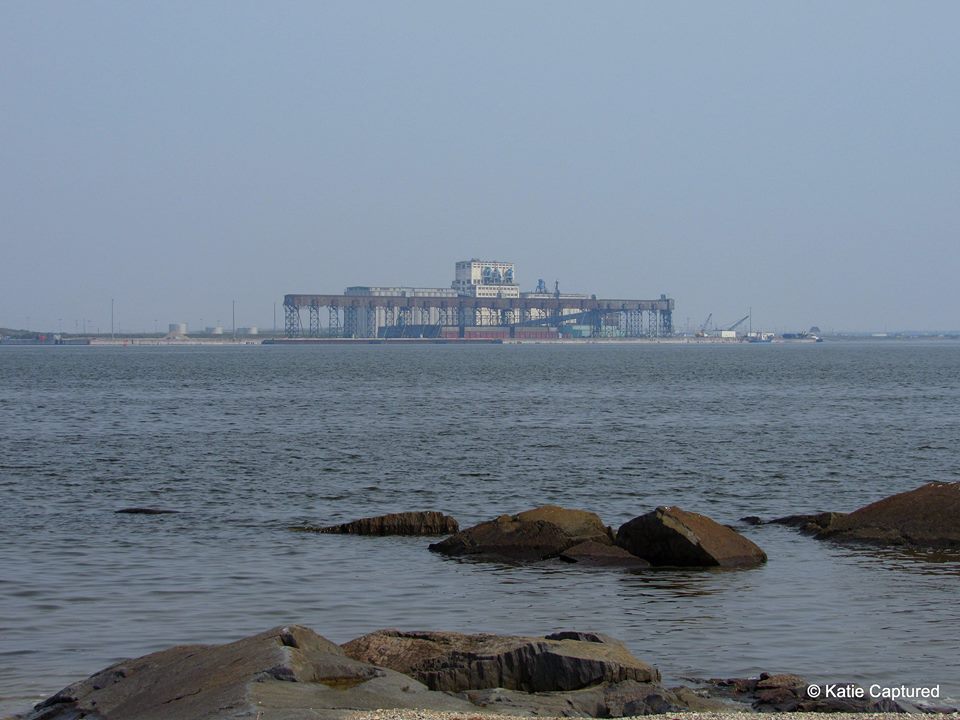
The Port of Churchill has been a symbol of uncertainty in Churchill. Katie de Meulles photo.
A Manitoba First Nations group has formed a partnership with an independent company to establish the reopening of the rail line to Churchill and potential operation of the grain port in Churchill.
Heard that before? Well, this time we might be in for the real thing.
A recent press release confirms that a consortium of Manitoba First Nations, led by Peguis First Nation Chief Glenn Hudson, will partner with iChurchill Inc., a private Canadian company, entering into an acquisition agreement with Denver-based Omnitrax, to take over control of the Port of Churchill and the Hudson Bay Railway.
“The port has got all of the grain handling equipment and simply said, the first thing we want to do is resume that commercial activity,” said Louis Dufresne, president of iChurchill Inc., in a phone interview Friday.
Northern residents of the town of Churchill along with Indigenous leaders say the railway and port are crucial to the existence of towns and all First Nations in northern Manitoba.
Last May, a year ago, the Hudson Bay rail line owned by Denver-based Omnitrax sustained flood damage from the spring melt of two late-season blizzards. The damage was estimated at nearly $60 million and Omnitrax balked at its contract to repair the damage and therefore reopen the train line to Churchill. Soon after, a native group under the name Missinippi Rail LP, a consortium of about 15 Manitoba First Nations, signed an informal agreement to purchase the port and rail line for $20 million. Further strengthening their offer and position, the group enhanced their buying power by joining with One North, a group representing First Nations and communities served by the Hudson Bay line.
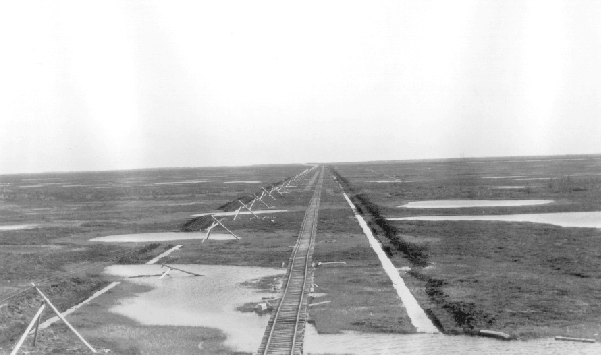
Photo by Major MacLachlan (zambonista.com/hbr/) [Public domain], via Wikimedia Commons
“Hopeful always when I hear these announcements, but of course like the people of Churchill, I just really would like to see the rail line rebuilt and the port reopened with solid commitments with whoever is going to take charge of the ownership that they are committed for the longer term.”
Now, iChurchill Inc. is hoping to formalize and seal the agreement by mid-June in order to commence repairs and reopen the line in time for the fall polar bear season. These details have not been confirmed by Omnitrax as of yet,
Communities have been suffering for a year now with increased costs of transporting goods to the outlying towns in the north. The isolation has touched everyone’s lives in every community. With another end of this dilemma in sight, people have been given hope once again.
iChurchill Inc. is expected to release more information today regarding plans for repairing the rail line and potential reopening of the port at a Winnipeg press conference.
Any new agreement would need approval from the federal government. Federal Natural Resources Minister Jim Carr is expected to release a statement Friday.
by Steve Selden | Mar 2, 2018 | Churchill News
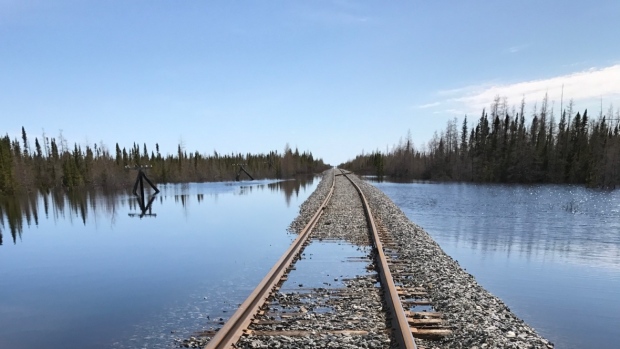
The HBRC will be solely responsible for any damages and costs to repair the rail line. Omnitrax photo.
The parent company of Hudson Bay Railway Company (HBRC), US-based Omnitrax, is off the hook for any damages lost in a pending lawsuit. HBRC will be solely responsible to the federal government if they are found liable for not repairing the washed out rail-line that links Churchill with the south of Manitoba. In May 2017 the tracks were washed away in nearly 20 locations rendering the stretch of tracks useless until millions of dollars are allocated for repair.
Omnitrax’s claim that HBRC is a separate entity has been upheld and thus the Federal Government of Canada has removed its name from the lawsuit.
Soon after two late spring blizzards began to melt, the tracks suffered severe damage in multiple locations. Omnitrax, based in Denver, Colorado, refused to spend an assessed $60 million for repairs. The company claimed economic hardship with regards to the project and was faced with the federal government threatening to sue after the 30-day start deadline elapsed.
The government filed a lawsuit this past November naming Omnitrax and HBRC as defendants. Under a 2008 agreement, Transport Canada indicated that Omnitrax was responsible for keeping the railway running through 2029. As a result, the lawsuit is seeking to recoup $18 million that was an original part of the terms to operate the port and rail line. However, the company has claimed the damages resulted from unforeseeable circumstances or “act of God” thus releasing them from their obligation to repair under their contract with the government.
Omnitrax counsel Jamie Kagan acknowledged that the Attorney General of Canada and Omnitrax have agreed to remove the parent company’s name from the lawsuit and relieve them from any judgment for damages. Any fault and levy of damages will now only be filed against HBRC.
“Our view has always been that this is a political action mainly brought for the purposes of PR and not for a legal remedy, and it appears that the Government of Canada, when pushed, ultimately agreed and has withdrawn the allegations against Omnitrax Inc.,” Kagan said in an interview after the hearing.
“As the private owner of the line, Hudson Bay Railway Company -which also conducts business under the name OmniTRAX Canada- had the obligation to repair the rail line when it was damaged,” a spokesperson for Transport Canada said in an emailed statement.
Churchill residents and business people have been faced with increasing costs for everyday supplies as most now are transported by air. Government subsidies have deferred costs to some extent though some residents have been forced to relocate to Winnipeg or other locations as a result.
Omnitrax is still trying to work out a purchase and sale agreement with a group comprised of northern Manitoba First Nations. Those talks have stalled since the disaster last spring.
by Steve Selden | Feb 26, 2018 | Churchill News
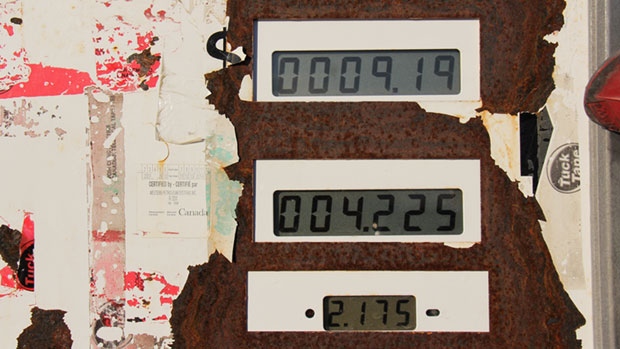
The deMeulles Auto Gas Bar in Churchill reflects the price of gas prior to the rail line washout. Dale deMeulles photo.
Churchill’s gas prices have been reduced by fifty cents a litre thanks to the federal government accessing the economic stimulus fund once again. With petrol prices nearing the $10/gallon mark, this latest reprieve will keep the cost at about $8/gallon. And we complain about gas prices when they reach $3/gallon or more? Kind of puts things in perspective a little, eh?
With federal findings of a probe of Omnitrax, owner of the Port of Churchill facility and the defunct Hudson Bay Line, due to be released soon, residents are enduring rising prices and increased isolation leading to economic strife.
Last week, Natural Resources Minister Jim Carr confirmed that the Ottawa government would allocate $132,870 for Exchange Petroleum to lower gasoline prices to prior levels before the Hudson Bay Rail Line was devastated by flooding last May. Shipping on the railway was the only way to keep costs for supplies and fuel low. Now, ten months later, the pressure is causing long-time residents to move south in search of a more affordable lifestyle.
In September 2016, Ottawa approved the Churchill and Region Economic Development Fund, intended for the diversification of northern Manitoba’s economy following Omnitrax laying off most of the port’s workforce that summer. Businesses have benefitted from the money by offsetting rising shipping costs of materials shipped by barge or airplane.
Last December Carr visited Churchill and announced the government would add $2.7 million to the existing $4.6 million relief fund. After seemingly turning a blind eye to the issue the federal government now is coming to the rescue.
The new windfall of cash will be transferred to Exchange Petroleum, owner of the Calm Air fuel-storage tanks located at the Churchill airport. These tanks are being used due to issues with the port’s storage tanks related to the viability of winter storage of the fuel.
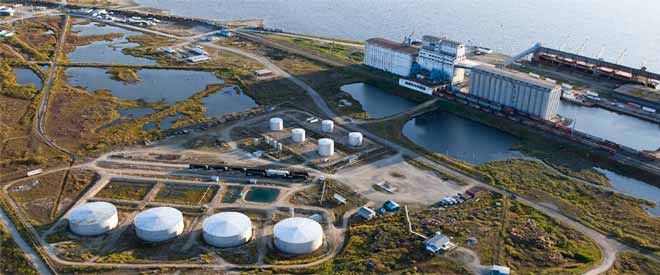
Churchill Port tank farm is unable to store fuel for the town through the winter. Churchill Tank Farm photo.
“This project is a great example of how collaboration and partnerships can help lessen Churchill’s acute economic hardships, restore a quality of life, and keep its entrepreneurs in business,” Exchange CEO Gary Bell wrote in a statement.
Churchill Mayor Mike Spence expressed thanks to Ottawa for its leadership and funding while conveying optimistic thoughts that rail line repairs would commence in the spring.
“This announcement means real savings for residents and businesses of Churchill during these difficult economic times,” Spence wrote. “It’s important to also give a great deal of credit to Exchange Petroleum who stepped in last fall.”








